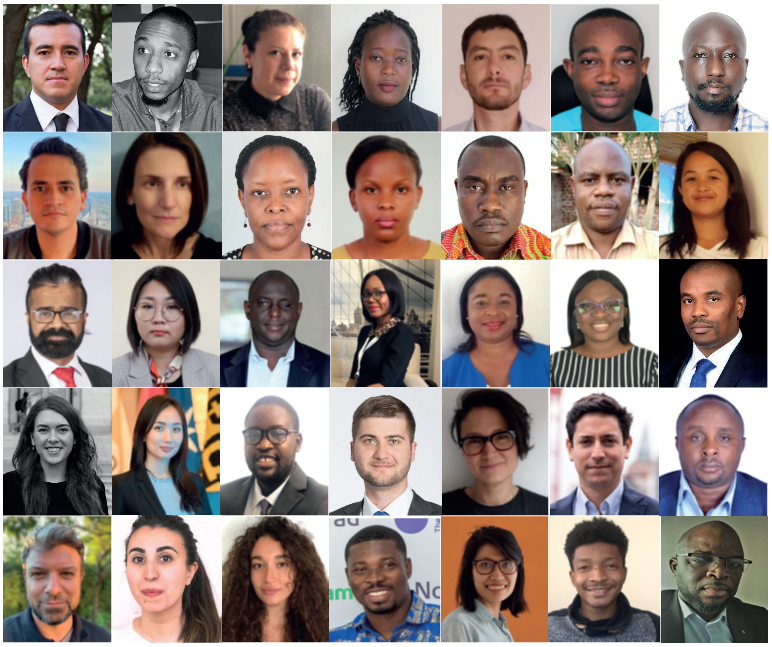
A Matter of Course: Consider Studying Resource Governance Online This Year
Applications for the 2022 advanced course Natural Resource Governance and Energy Transition: Policies and Practice are open until 10 April. A limited number of scholarships are available. So why should you consider applying? We caught up with some of last year’s participants about what drew them to the course, and why resource governance is crucially important in their countries.
Over eight weeks in the last quarter of last year, 35 learners from 21 countries across Africa, Latin America, Asia, Europe and North America took part in the course, co-organized by the Natural Resource Governance Institute and NADEL – Center for Development and Cooperation at ETH Zurich.
Delivered online for the second year, the course featured lectures by experts from various fields and institutions and allowed participants to delve into the most pressing issues and topics in resource governance, including taxation and fiscal regimes, revenue management, environmental and social impacts of extraction, and the energy transition. After an intensive self-study phase, participants selected topics from two areas of specialization that were most relevant to their current work or interests.
Participants in the advanced course hailed not only from geographies where resource governance plays an important role but also from different corners of the extractive sector itself: among the learners were journalists, civil society actors, academics and government officials. They shared their unique views and experiences from the context of their own countries but were also able to learn from methods or best practices tested in other countries facing similar resource governance issues.
For Isaac Aidoo, an award-winning journalist for Ghana’s Finder newspaper, the most useful part of the course was learning how countries can secure a good deal for their subsoil assets and how they can use oil and gas revenues productively. “With regards to the licensing rounds in oil and gas blocks, there have been challenges with transparency and accountability,” Isaac told us. “In Ghana, oil and gas revenues were spread too thinly across all sectors and we are not able to monitor them effectively,” which he said made it hard to see positive economic impacts of extraction.
Pilar Federica Acosta, who works on extractive sector governance at Transparencia por Colombia, also highlighted aspects of the course focusing on environmental and social impacts and the energy transition. She believes that good resource governance can “permit more inclusion, participation … and a better-informed society” to hold governments accountable and ensure not only economic outcomes but, also sustainable development that includes local communities.
For Carolyne Nakajubi from Action Aid and Grace Namugambe of SEATINI, both based in Uganda, the course was fundamental in gaining a better understanding of the governance challenges facing the country’s emerging oil and gas sector and building knowledge of resource governance. Carolyne mentioned that “our oil and gas sector is just developing and when I looked at this course, I thought it would be very important to understand what is happening and be able to interpret it better,” adding that “most of us did not have backgrounds before that would facilitate our engagement in the sector.”
Ricardo Guerrero, a doctoral student in international development at King’s College London, and Grace, both specializing in fiscal and tax policy, felt that the course expanded their knowledge on the topic. Grace said: “The course provided insight and enriched my knowledge on tax, fiscal policies and extractive sector,” while Ricardo noted that the tax modeling exercises and practical aspects of the course proved especially useful in deepening his understanding of the topic and policy implications.
For both Carolyne and Isaac both prized the lectures focused on state-owned enterprises. “The course helped me understand some of the decisions that the Ugandan government has taken,” Carolyne said, “The Uganda National Oil Company was established, and we didn’t immediately know what the implications would be.” As Uganda prepares to start producing oil, revenues will flow into government coffers, which has important implications for transparency and accountability. She added, “The course also exposed me to discussions and drawing lessons from other countries,” including Ghana’s Public Interest and Accountability Committee. For Isaac, the course also offered insights into resource governance of the state-owned Ghana National Petroleum Corporation: “When it comes to accountability, there is a shortfall. We have been advocating for transparency and no conflicts of interest in GNPC’s leadership. A lot of work needs to go into this to ensure Ghana can make the most of its oil and gas revenues.”
Adrian Duhalt, a postdoctoral fellow at Rice University, shared that he is already using the lessons of the course to write about resource governance in Mexico’s nascent lithium sector, as well as Guyana’s offshore oil and gas sector. Both Adrian and Isaac recommended the course for journalists and civil society members seeking a better understanding of the complexities of the natural resource sector.
Countries and policy makers across the world will have to navigate the energy transition to mitigate the impacts of climate catastrophe. This means difficult choices and trade-offs that require rethinking extractive sector strategies. Strong resource governance policies that enable citizens to realize the benefits of their country’s natural resources are now more important than ever to ensure a just, equitable and sustainable energy transition that balances economic development with environmental and social protection. A better understanding of what is at stake is essential. Last year’s advanced course offered the key topics and policy solutions that will enable participants to advocate for transparency and accountability in their country’s extractive sectors. Consider joining us for this year’s edition.
Pavel Bilek is a research and data officer at the Natural Resource Governance Institute and a participant in the 2021 advanced course.

